It may seem surprising, but what I love most about being in the wilderness is the food. Everything tastes better outdoors – fact. Our rented campervan, currently being driven down the length of New Zealand’s North and South Islands, comes with two gas-powered stoves, a steel kettle, a chopping board, a couple of pans and a very sharp knife. It is a collection of kitchenware stripped back to the essentials, and I am in my element.
I love cooking. I love thinking about food, in the quiet moments idly daydreaming about what I’m going to cook for dinner. In the last year or so, that love of cooking disappeared (and along with it, the desire to drink wine). There were days when I wished I didn’t have to eat at all. Eating was simply something that needed to be done – something to deal with and get out of the way. It would have been easier to be a vampire.
Thankfully, all that asceticism is over. My appetite has returned – I love wine again! As we move further south and New Zealand drifts into autumn, I am excited to fire up the stoves every evening. I have always found something satisfying about making do with very little – living life out of a backpack, returning to a mode of self-sufficiency. Not having anything to worry about except what to eat. Arriving on a windswept beach or the banks of a lake, bringing together a handful of ingredients to create something tasty.
I am not entirely sure why everything tastes better outdoors. Perhaps you feel as if you’ve earned it. Perhaps because there are no distractions, and your attention is allowed to flow freely, from your surroundings to the gentle ebb of sensations. It is perhaps that feeling of wholeness, a sense of connection to your surroundings.
I have read various things recently about fragmentation. We live in fragmented times and our attention is more fragmented than ever. I have felt this too – an inability to focus or sustain my energy in a single direction – constantly flitting between different ideas, different platforms, looking for inspiration of some kind, but unable to focus on anything long enough to find it. Now, freed of all obligations for a while, I’m trying to slow down, to learn how to pay attention again.
“Attention is the rarest and purest form of generosity,” wrote Simone Weil, the French mystic philosopher, in Gravity and Grace (1947). To truly pay attention, you have to put your own ego aside for a moment. You have to allow someone or something else to become, momentarily, the most important thing in the world. I am guilty of solipsism as much as anyone, and perhaps this is why Weil’s words really struck a chord with me. They were a wake-up call to engage with the world with more curiosity and generosity – to start looking outwards again.
Things that ignite our senses have the power to pull us out of ourselves and back into the world. This is no less true of cooking. It requires generosity, of time and of spirit. Doing it well requires your full, undivided attention. It is also a way in which we pay attention to others, to the appetites and tastes of those we are feeding. The best kind of food is not performative, but that which is made with the recipient in mind. It breaks down the barrier of the self, in recognition of the other. It may not always be a work of art, and it is far from the world of high cuisine. But at its best, it is comforting, nourishing and thoughtful. Such cooking is surely one of the greatest acts of generosity.
I’m reminded of Trân Anh Hùng’s 2023 film The Taste of Things. Set in the Central Loire in 1889, it’s about a celebrated gourmet chef (Benoît Magimel) and the cook who works for him (Juliette Binoche). Binoche’s character, Eugénie, delights her boss with beautiful yet unpretentious dishes: a centrepiece vol-au-vent, creamy crayfish encased in a basket of crisp pastry; a traditional pot-au-feu, braised beef, potatoes and carrots in a rich broth. He, in turn, shows his care by preparing an exquisite dinner for her. Each dish is brought out at exactly the right moment, the greatest attention paid to every detail. A poached pear, glistening in the candlelight, is suggestive of what comes next. Various themes ebb under the surface, among them, questions of cooking as art and as labour. But it’s overarchingly a film about pleasure, sensuality and reciprocity; the act of cooking for another as the highest act of service.
To cook in this way is undoubtedly a privilege and a luxury. It requires a fair amount of leisure time, and by extension, a degree of financial and material stability. I’m aware that I don’t have to keep anyone alive, and the person I’m cooking for is (unlike me) delightfully unfussy. I don’t take it for granted. I have temporarily bought my freedom, and when the money runs out, real life resumes. I dream of beautiful kitchens, but am unlikely to be able to buy a house in the foreseeable future. Still, to me, it is worth the exchange, because if you don’t know what you want to do with your life, you may as well try to enjoy it.
It is all too easy to be swept away by austerity, to let a kind of spiritual boredom set in. Pleasure offers an antidote. I know I am at my best, in mind and spirit, when I am excited to cook, when I want to share my food with others. I am at my most generous and connected, and it had been too long since I’d felt like that.
Notes from a month on the road
A photo diary
The first night camping in Northland, the far subtropical north that stretches out above Auckland. Eating pasta with black bean chilli, and drinking a Pinot Noir under the southern stars, the Milky Way shimmering across the girth of the sky. Seeing for the first time the great ship of the south, the Argo Navis, formed by the constellations of Carina, Vela and Puppis. The sprawl of Centaurus. Orion the hunter, now shining upside down. The thrill of a new sky of stars.
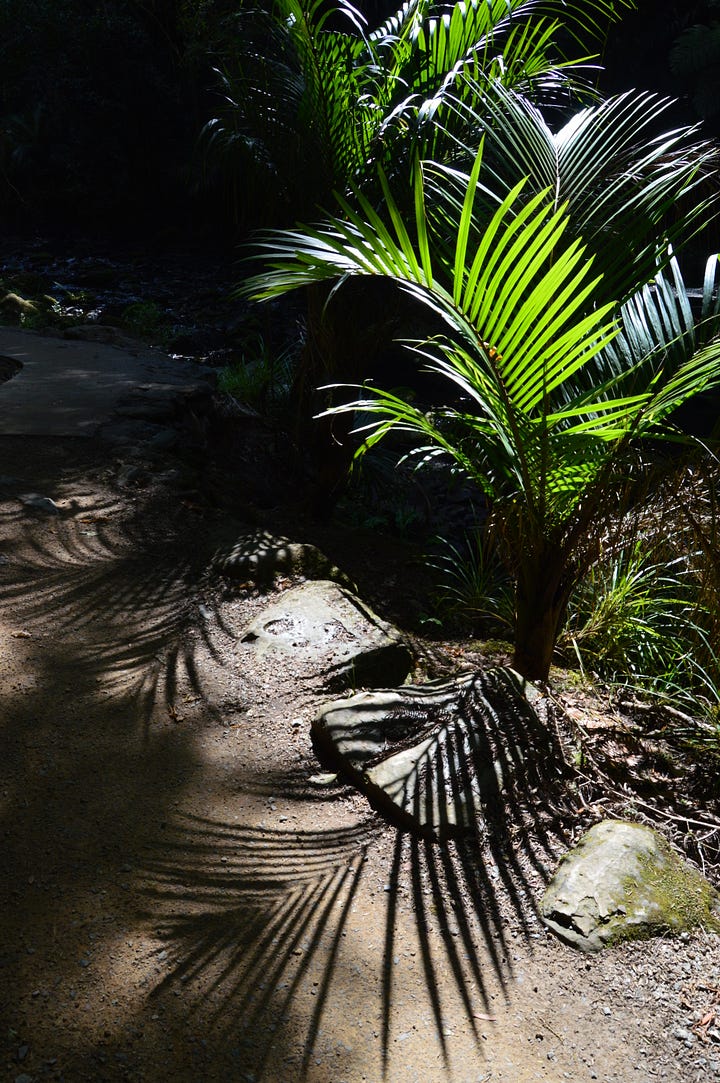

Roti quesadillas in Coromandel, where it still feels like late summer. I cook a Turkish-inspired mix of charred onions, peppers and tomatoes, folding it into the roti with melted cheese. We’ve just visited Kumeu River, and we have a bottle of the 2018 Hunting Hill to drink with dinner. Bright notes of citrus and green apple slowly give way to a soft creamy depth. On my phone, I write that drinking this wine is like wading into a cold stream, feeling the sharp sunlight on your face. As you wade deeper, the water softens. You mellow into it. Then you turn on your back, and there is nothing but buttery sunshine and the cool ebb of the water underneath.
Our first night on the South Island, slowly cooking a simple dahl by the sea, simmering a fresh tomato with garlic, chilli and garam marsala, stirring in the split red lentils and stock, letting it cook over a low heat. Pacific waves crashing on the beach as light slowly drains out of the day. Then comes the rain. My head torch goes dead with the first drop of rain, so I finish the dahl in the dark and wet, somewhat miserably. Still, enjoyed with roti, a dollop of yogurt and a glass of Ray’s Road Chardonnay, huddled under the car boot, it’s pretty good regardless.
From Marlborough down to Kaikōura, the most spectacularly scenic coastal drive with dolphins spotted in the sky-blue waves. Kaikōura: kai meaning “food”, kōura meaning “crayfish”. The old story goes that a Māori explorer once found himself on this stretch of coast, and was so delighted with the abundant crayfish that he named the settlement after it. I imagine him sitting on the beach, grilling his catch over a fire as the sun goes down, grinning at his good fortune. In time, others heard tales of the crayfish and followed, as did we. We walk along the length of the peninsula until we come to a seafood shack, where we stop to eat crayfish fritters with a glass of Marlborough rosé. A light lunch for a beautiful autumn day.
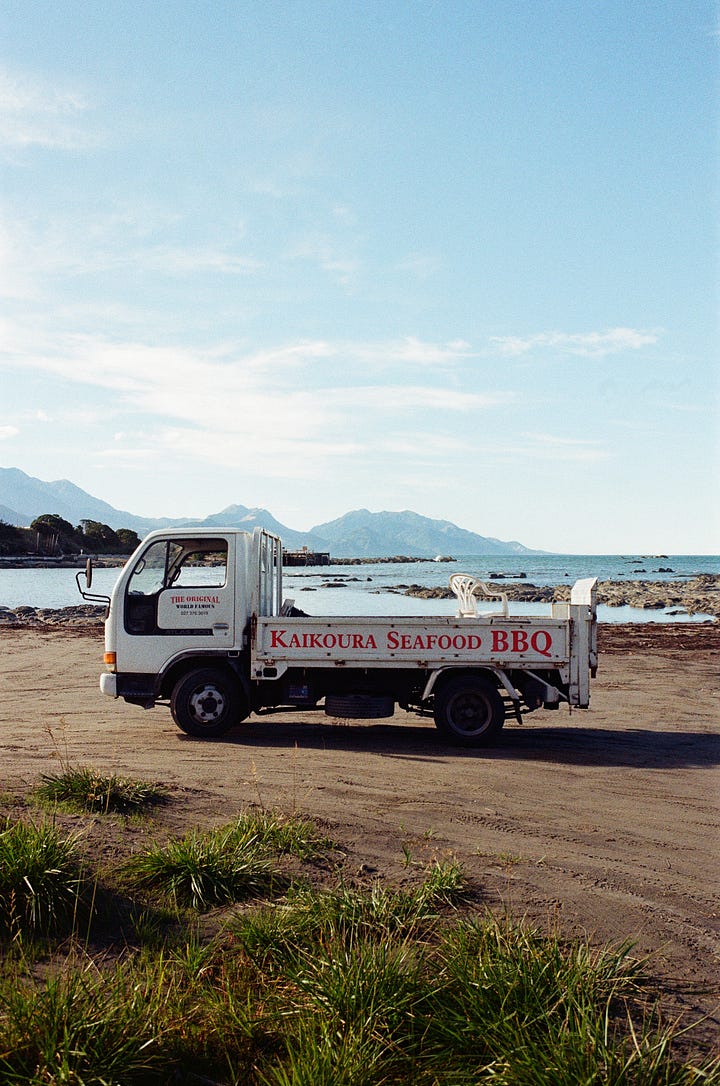

Running out of water and stove gas in a remote valley in Arthur’s Pass, where night temperatures reach two degrees celcius and snow caps the mountains. Dinner is cheese sandwiches and olives, and what remains of an excellent bottle of Ray’s Road Chardonnay, with a hot water bottle stuffed up my top. In the morning, we treat ourselves to a warm breakfast and coffee in the village, before a very steep 7-hour hike (ascending 1,100 metres in 3.5 kilometres) with some of the most extraordinary mountain views I have ever seen. Black tea and biscuits keep us going. I have come to believe that tea and mountains are a match made in heaven. No hiking lunchbox is complete without a Thermos.
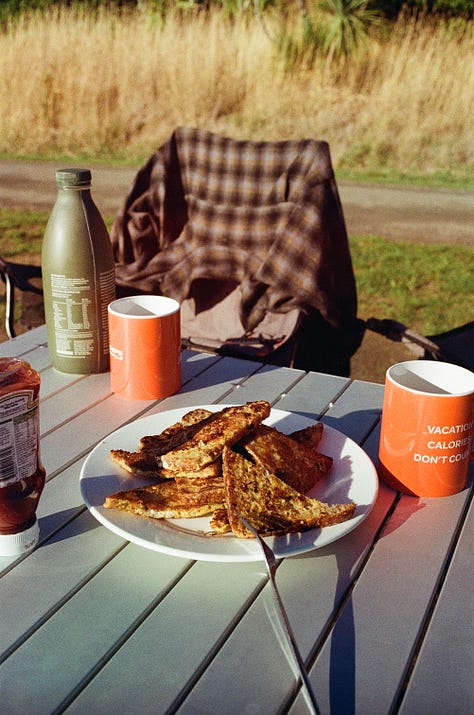
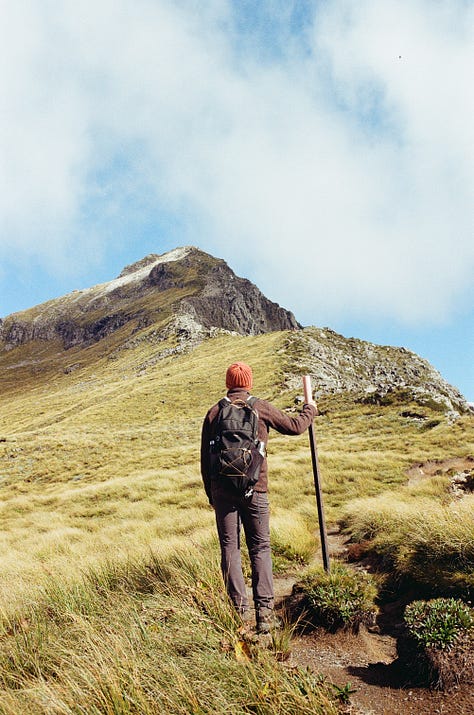

Two days later, fully replenished, we drive down the west coast to Franz Josef glacier and camp by a lake. To celebrate having supplies again, I make giant couscous with fire-charred aubergines, and feta fried with tomato, chilli and olives, finished with fresh coriander. After dinner, we open a bottle of Greystone’s barrel-fermented Sauvignon Blanc, picked up from the winery in Waipara Valley, Canterbury. Notes of gooseberry and lychee are balanced by baked apple, mango and gentle hints of toast. It’s a delicious surprise, sure to impress even the most hard-nosed Sauvy B snob.
Further inland in Otago, on the banks of Lake Hāwea, we discover a couple of golden pears that have been forgotten about, bruised and leaking under the pots and pans. I simmer them down into a jam, mixing in a dollop of honey and half a lemon. Huddled under blankets, we eat it spread over three locally made cheeses, Nevis Maasdam, Mount Scott Havarti and Kawarau Blue. The sun goes down and the Pink Moon rises, with Spica – the brightest star in Virgo – shining beside it like a beauty spot. The lake beach is bathed in rose-gold moonlight. Across the water, the dark and silent form of mountains, and the lonely light of a car twisting around the bends.
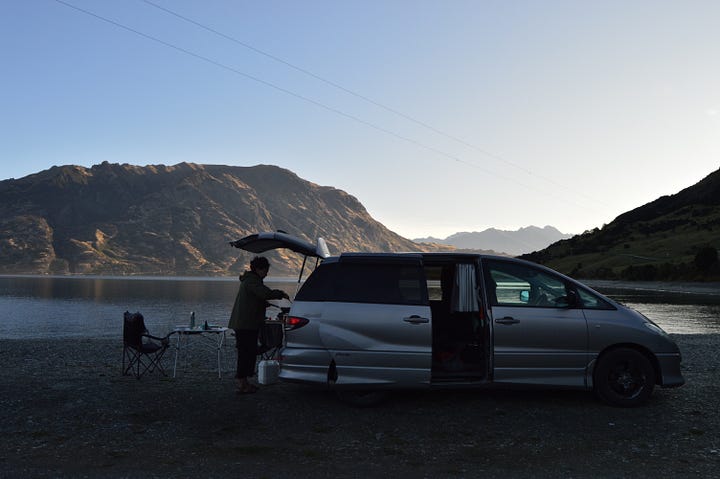
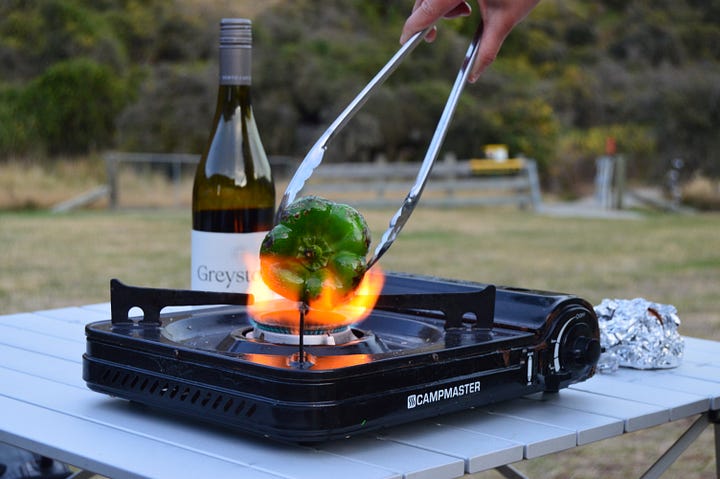
We arrive in Fiordland, at the furthest reaches of the South Island, to relentless rain all afternoon. I throw together a picnic bag with a loaf of bread, a pack of crinkle-cut sour cream and chive crisps, a jar of mayonnaise and Dijon mustard, a flask of tea and some biscuits. For later, a box of cheese and a bottle of Syrah from Greystone. We close all the doors and get cosy, snacking on crisp sandwiches as the rain slides down the windows. I wonder why anyone bothers eating anything else but crisp sandwiches. The softness of the bread against the deep-ridged crisps is the perfect texture, and the sour cream and chive flavour is delicious with the mayonnaise and mustard. There is zero nutritional value, and it’s bloody good.
Good Friday in Glenorchy. We’re almost out of food again, but we have a couple of packets of instant noodles left, “hot and spicy” flavour, tomatoes, some coriander and a box of eggs. There’s no signal, but I vaguely remember a recipe for a Chinese tomato and egg-drop soup. The sachets turn out to be pretty good, like a Thai red curry paste fragrant with galangal and lime leaves. The noodles soften and the tomatoes collapse into a spicy sauce. I drop an egg in and whisk. It’s all done in five minutes. We eat and a light rain starts to fall, while families and couples pitch their tents for the Easter weekend. We’re all racing against the darkness, night arriving ever quicker each evening.

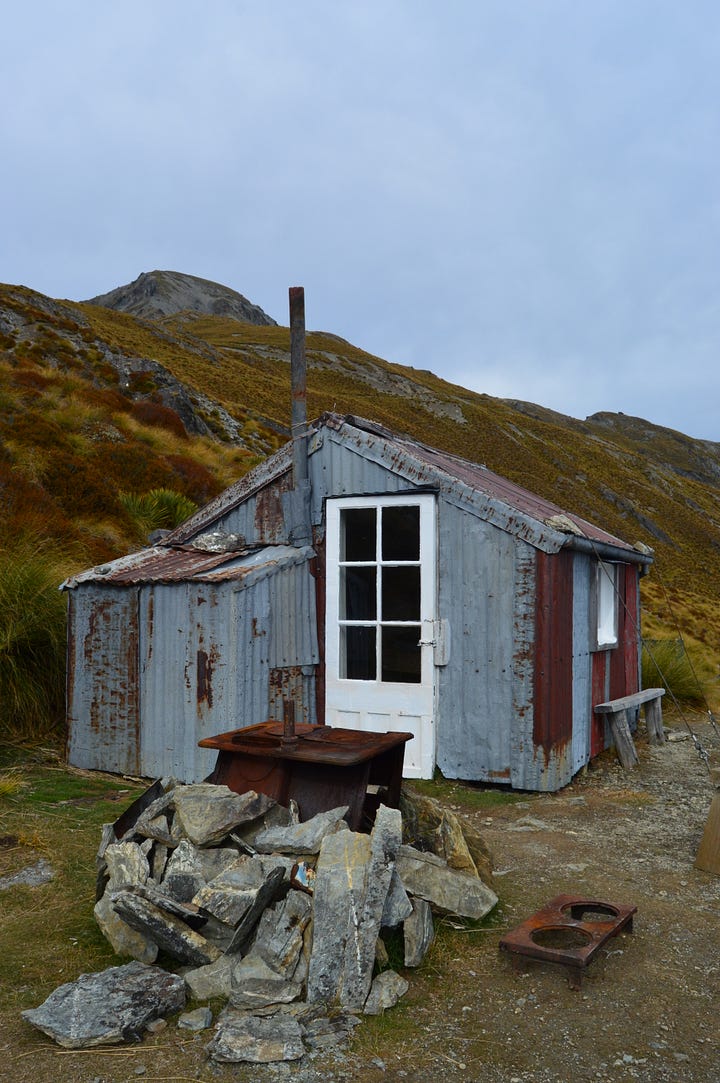
On Easter Sunday, I feel more acutely the sense of the world being turned upside down. As the Northern Hemisphere celebrates the renewal of spring, we are now in the depths of autumn. The landscape is quiet, stripped of its colour, and the trees are ablaze with gold. You can feel autumn’s slow exhalation all around you. I remember an old story about the underworld and the seasons. Death and resurrection, the daughter returning to the world of the living bearing flowers. With her comes the soft spring breeze, the promise of fertility. Eggs, then, provide a fitting lunch. On the banks of Lake Poaka, I fry some toast and cook scrambled eggs, using as much butter as I can. We bought a small block from a petrol station this morning to see us through our final two days, and we need to get through it all (if ever one needed an excuse to cook with obscene amounts of butter). The rich and salty indulgence of butter, made smoky by the gas stove, is a delight. We sit under the gold leaves of a crack willow, drinking black tea with our Easter lunch and thinking about spring.
On our final morning, somewhere towards Christchurch, I make shakshuka using up all the remaining ingredients. The sauce glistens a rich red in the morning light, and it makes me think of Almodóvar’s tomatoes in Women on the Verge of a Nervous Breakdown – the juicy, almost murderous intensity of them. But we’ve made it through a month in the car; neither of us is mad, and no one is getting poisoned this morning. I break in two eggs and let them poach. We ladle the shakshuka over a heap of fried bread, the yolks gloriously runny. The addition of finely diced aubergine, though unconventional, adds a surprising softness to the dish, something sweet and fleshy. There must be a better pairing for this dish than instant coffee, but it’ll do. Then it’s onwards to Christchurch and back to civilisation. I’ll never take a flush toilet for granted again.





I have always believed that cooking food for those you love is the best spiritual nourishment, for recipients and chef alike. I'm glad you love food again. happy travels, stay safe.